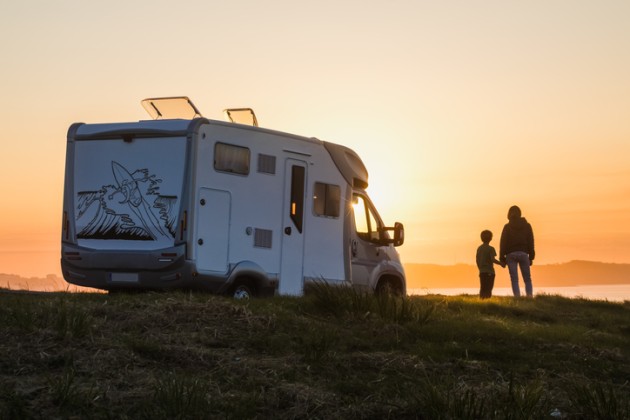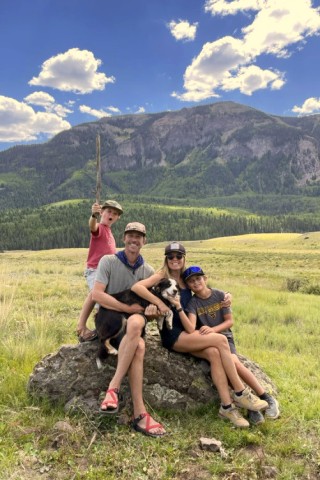Dear Highlights Podcast: One Family Discusses Their “Permanent Vacation”

Parents Trent and Carly Shepherd join Christine French Cully, Highlights’ Editor-in-Chief, and Hillary Bates, Director of Purpose and Impact, on the Dear Highlights podcast to share more about a major lifestyle change they embarked on with their two sons. They recognized that childhood is a short, sweet season and made a travel plan to see the country together, learning, working and exploring on the road. What can we learn from a family whose family time is 24/7?
Christine starts by explaining how Highlights often receives letters and emails from kids who want more meaningful time with their families—time to talk together or play, without distractions.
She shares a letter from 9-year-old Maureen who says,
Dear Highlights,
My dad is always working. And even when he says he’s done and he’ll spend time with me, he does not.
Hillary says they also hear from kids who feel overscheduled and just want more free time.
Jane wrote,
Dear Highlights,
I have a problem. How am I going to get to play outside? I have so many things to do when I get out of school. I get out at 3 and sometimes after school we play basketball in the gym. One night a week I go to band and don’t get home until 4:30. Two nights a week, I have other things. I still have a lot of homework and an instrument to practice.
Other readers write to share worries about how they spend their time:
Help! I think I have a major addiction to screens and that is not good.
“Kids seem to know the important things that may be missing from their daily lives… [But] it’s hard to change things up, to clear the deck. It can be hard to make even small changes,” Christine notes.
Hillary agrees but says we’ve all just lived through a historic moment, and one of the silver linings is that it’s “an invitation to think about what in our lives we were doing on rote that works and what might we really want to change.”
It’s not every family’s dream to go on the road and spend that much time together, Hillary acknowledges. But she hopes hearing the Shepherd’s story will inspire mini-adventures and how to lean into things that get them excited.
Christine starts by asking the Shepherds what they do and what their life was like before they started on their epic adventure.
Trent shares he’s lived in Austin, TX his whole life. He’s a graphic designer and musician, and he’s owned a small website company for about 18 years. Before they embarked on their adventures, Trent says their lives were “pretty domestic and scheduled.” He explains, however, they’ve always loved traveling and exploring the US and other countries.
With a background in ecology and career as a landscape architect, Carly explains how she worked part-time and also taught yoga and mindfulness. Nature and mindfulness have always been a big part of their family, and they prioritized being outside as much as they can.

They had a house and their two boys, Gray (11) and Ty (8), went to a brick-and-mortar school and did typical kid activities before they went on the road.
Christine asks what the catalyst was for making such a big life change.
Carly says that traveling has always been a big part of hers and Trent’s relationship. She recalls the many conversations they had about what their dreams are for their family, and they often discussed how they could take their family life on the road, while still working and doing school. The dream felt abstract for a long time, but the desire to make it happen was always there.
The Shepherds planned to take their kids out of traditional school and start world schooling in 2021. However, when the pandemic started in 2020, the world changed. The pandemic gave them a chance to reevaluate their plan. Carly says the stars aligned—they had the right mindset and jobs that allowed them to work remotely. They were open and curious about homeschooling, and it felt like their kids were the right ages for it. Trent adds that the stage was already set in their hearts and minds.
There was another significant event, Trent shares, that pushed them toward putting their plans in motion. His mom died from ALS in 2019, and her passing made them truly realize the fragility of life. They took a year to reflect and mourn and it was the nudge they needed to get started.
Christine asks about how confident they were when they first started their journey or did they have a “what are we doing?” moment.
Trent replies, “Yes!” They felt excited throughout the preparation process because they knew it was bringing them closer to chasing their dreams. He says it was incredibly exciting to pull out of the driveway for their first adventure, but he also shares that there were so many unknowns and anxiety as well.
He lists off the “what ifs” and the “how exactlys” that were running through his head about the safety and security of their family. What would working remotely from the road look like? What if the trailer gets a flat tire? What if something breaks?
From the beginning, though, they had a family contract. They knew things would go wrong and wouldn’t be smooth sailing all the time. It’s a great adventure, Trent explains, but they acknowledged there will be challenges. He says acknowledging this was and is a great life lesson.
Christine is curious to know where they’ve been and how many miles they’ve logged.
Carly describes the rhythm of their travel. They go out on the road for several months and then come back to a cabin they have in Hill Country in Texas. This allows them to have a homebase to ground them and be still.
They went west on their first travel loop, though Idaho, Montana and Colorado. On their way back, Carly says, they went through Utah and Arizona. This trip was a total of 6 months. The second excursion was to Florida during the winter. They’ve been to the Pacific Northwest as well. They try to make every stop count and research what they’d like to do and see.
The highlight of their travels so far is last winter on the Baja Peninsula, Carly shares. She describes it as dreamy, and it felt like every family member was thriving.
Christine asks about how the travel has affected the kids.
Trent says it’s influenced them more than they could’ve dreamed. One of the coolest aspects of the travel is seeing how much their kids’ relationship has changed and blossomed. When it’s just the two of them, they’re each other’s only playmate, Trent notes. They’ve grown a lot closer.
One of the dreams and goals they had for the kids was for them to see the world in a much bigger way, Trent continues. They wanted them to live outside their previous bubble of Austin, TX.
Trent brings up being in Baja as an example of this. He describes them being on a beach with a group of children who didn’t speak English, and the boys started playing soccer with them. They were quickly “speaking the global language of having fun together,” he says.
Christine shares how Highlights emphasizes that “we’re all more alike than different” and notes how the Shepherd kids are living that in a very visceral way.
Carly says she’s hopeful the children’s experiences “are setting the foundation of being open to a wide diversity of people and cultures and landscapes.”
Hillary recalls Trent mentioning their kids’ willingness to embrace this adventure as a factor when they were deciding to make it happen. She asks about how the kids reacted when they proposed the idea and how they felt when the adventure began.
Trent says the kids love new experiences. It didn’t take much to sell them on the idea of getting a trailer and going to explore places they’d only learned about in books.
Carly adds that a big piece of living their lifestyle is being honest and open in their communication. They say they’re committed to this adventure one year at a time. They regularly check in with each other, she explains. As long as it’s still working, they’ll continue their adventure. But if something doesn’t feel right, they’ll reassess.
The way they travel has evolved since they started, Christine notes. She brings up their current bus renovation.
Carly shares how excited the boys were to help with the project and how that excitement pushed them to take it on. Trent notes that buses are safe as well as spacious and make sense for living on the road, so it’s a welcome change. He also notes that now the boys can have the bunk beds they’ve been dreaming about.
They started their adventure in a refurbished Airstream, Trent shares, which was the best option at the time. Now they know more about living on the road and what will fit their needs going forward. With the bus, they can have a space that’s uniquely their own.
Hillary notes some people will listen and think, “I could never do this.” However, there will be people inspired by this journey and want to do something similar. She asks what advice they would offer to those people.
Carly says if it’s something that’s appealing, go for it. It doesn’t need to be a long-term experience. It could be a short-term adventure. She says it’s OK to start small and communicate about what’s working and what’s not. The flexibility can be a little overwhelming when you’re getting started, she acknowledges, but it’s important to go into the experience with open-mindedness.
Trent adds it’s also important to approach the experience with intention, whether the goal is getting away for a long weekend, the entire summer or longer.
Christine asks about how they’re documenting this experience.
Trent shares their boys draw and write in travel journals, which are part of their school curriculum. They have geo-journals as well. When they explore, they collect rocks, crystals, gems, shark teeth and bird feathers to document the different landscapes and places. They’re also on Instagram (@shepquest), which has been an amazing way to document where they’ve been, but also to keep in touch with friends they’ve met along the way and family.
One of the hard things is staying connected to the people they meet on the road, Trent notes, and social media has helped maintain connection.
Christine asks the final question: “In your travels have you seen anything that’s made you think that if we truly believe that children are the world’s most important people, we’d think about this particular thing differently or make something more of a priority.”
Trent says, “We 100% believe that children are the world’s most important people. Carly and I talk about…how we can make an impact. What can we do? We really believe that change happens at home. Maybe the best thing we can do is invest our hearts and time into our relationships with our kids so we can help them become the best versions of themselves. Hopefully, in turn, their relationships and their communities and their world will be a better place someday. That’s our primary intention… We have a lot of face time with the kids and there’s lots of opportunity to learn lessons and to experience struggle and challenges with them and [experience] the good times and the bad times.”
Our goal of the “Dear Highlights” podcast is is to elevate the voices of children from these letters and help parents raise kids to be curious, creative, caring, and confident.









